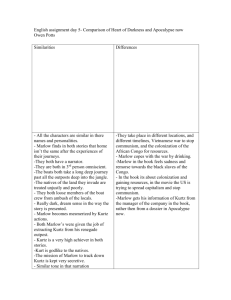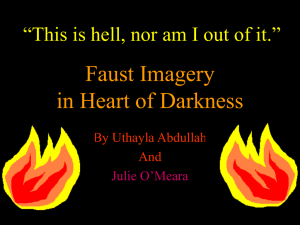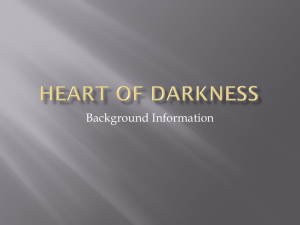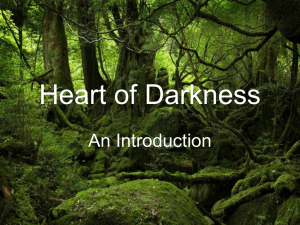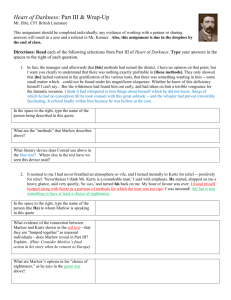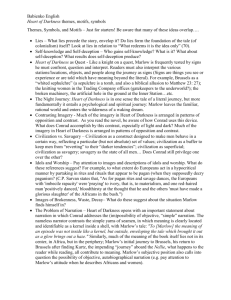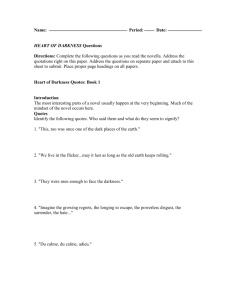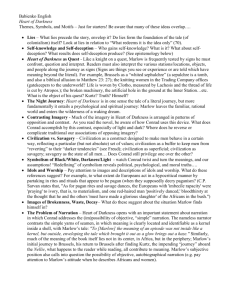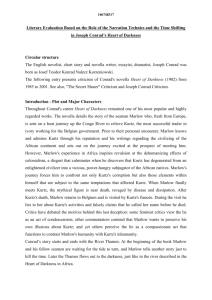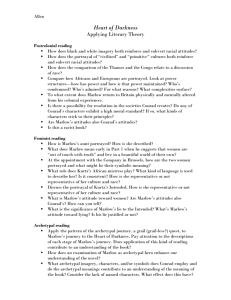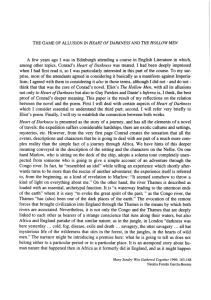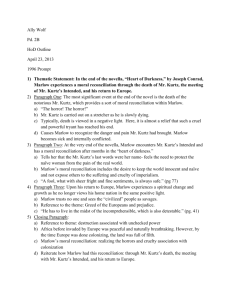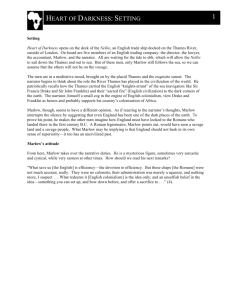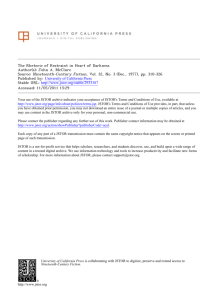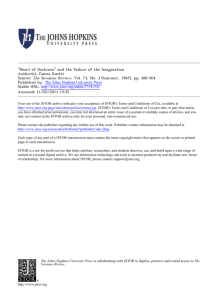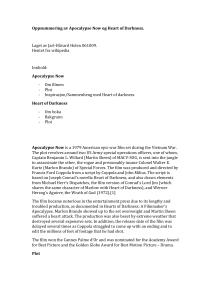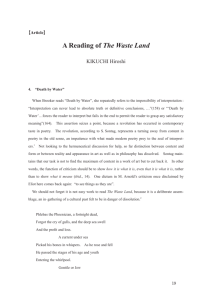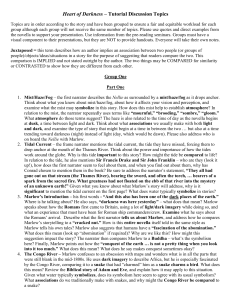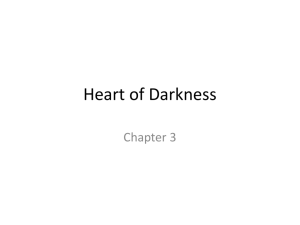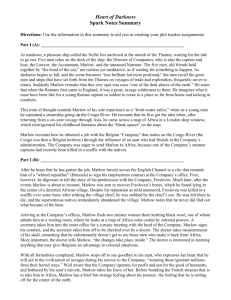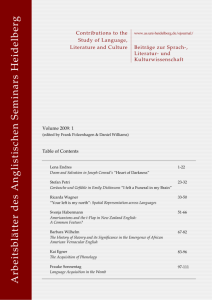Study Questions for Conrad`s Heart of Darkness
advertisement
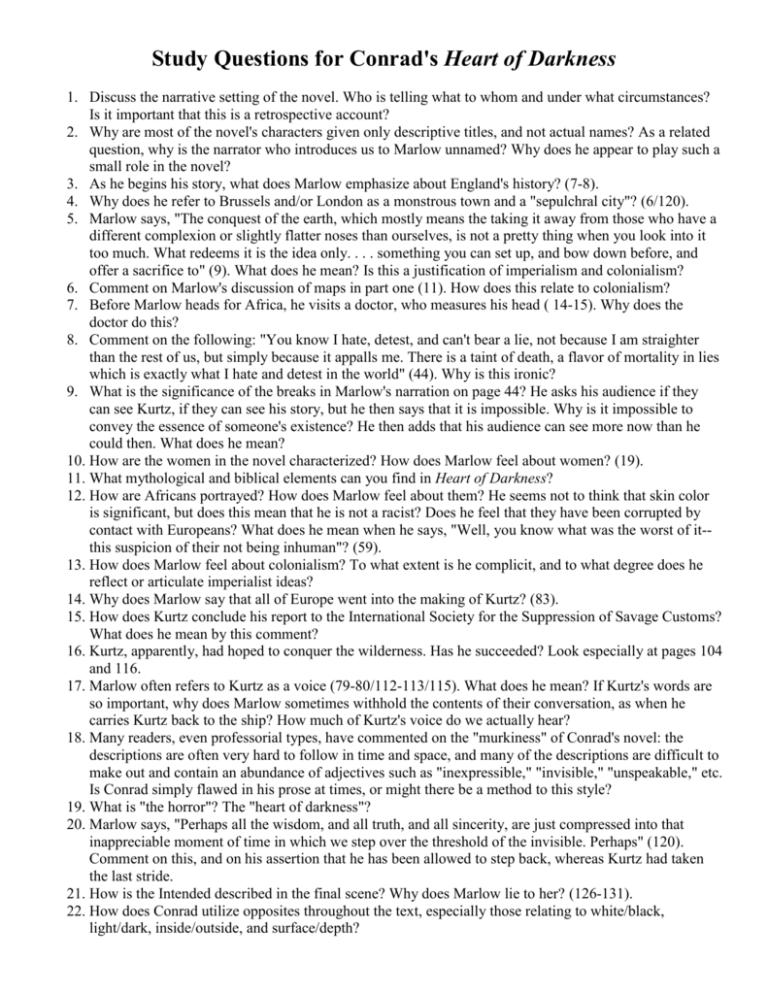
Study Questions for Conrad's Heart of Darkness 1. Discuss the narrative setting of the novel. Who is telling what to whom and under what circumstances? Is it important that this is a retrospective account? 2. Why are most of the novel's characters given only descriptive titles, and not actual names? As a related question, why is the narrator who introduces us to Marlow unnamed? Why does he appear to play such a small role in the novel? 3. As he begins his story, what does Marlow emphasize about England's history? (7-8). 4. Why does he refer to Brussels and/or London as a monstrous town and a "sepulchral city"? (6/120). 5. Marlow says, "The conquest of the earth, which mostly means the taking it away from those who have a different complexion or slightly flatter noses than ourselves, is not a pretty thing when you look into it too much. What redeems it is the idea only. . . . something you can set up, and bow down before, and offer a sacrifice to" (9). What does he mean? Is this a justification of imperialism and colonialism? 6. Comment on Marlow's discussion of maps in part one (11). How does this relate to colonialism? 7. Before Marlow heads for Africa, he visits a doctor, who measures his head ( 14-15). Why does the doctor do this? 8. Comment on the following: "You know I hate, detest, and can't bear a lie, not because I am straighter than the rest of us, but simply because it appalls me. There is a taint of death, a flavor of mortality in lies which is exactly what I hate and detest in the world" (44). Why is this ironic? 9. What is the significance of the breaks in Marlow's narration on page 44? He asks his audience if they can see Kurtz, if they can see his story, but he then says that it is impossible. Why is it impossible to convey the essence of someone's existence? He then adds that his audience can see more now than he could then. What does he mean? 10. How are the women in the novel characterized? How does Marlow feel about women? (19). 11. What mythological and biblical elements can you find in Heart of Darkness? 12. How are Africans portrayed? How does Marlow feel about them? He seems not to think that skin color is significant, but does this mean that he is not a racist? Does he feel that they have been corrupted by contact with Europeans? What does he mean when he says, "Well, you know what was the worst of it-this suspicion of their not being inhuman"? (59). 13. How does Marlow feel about colonialism? To what extent is he complicit, and to what degree does he reflect or articulate imperialist ideas? 14. Why does Marlow say that all of Europe went into the making of Kurtz? (83). 15. How does Kurtz conclude his report to the International Society for the Suppression of Savage Customs? What does he mean by this comment? 16. Kurtz, apparently, had hoped to conquer the wilderness. Has he succeeded? Look especially at pages 104 and 116. 17. Marlow often refers to Kurtz as a voice (79-80/112-113/115). What does he mean? If Kurtz's words are so important, why does Marlow sometimes withhold the contents of their conversation, as when he carries Kurtz back to the ship? How much of Kurtz's voice do we actually hear? 18. Many readers, even professorial types, have commented on the "murkiness" of Conrad's novel: the descriptions are often very hard to follow in time and space, and many of the descriptions are difficult to make out and contain an abundance of adjectives such as "inexpressible," "invisible," "unspeakable," etc. Is Conrad simply flawed in his prose at times, or might there be a method to this style? 19. What is "the horror"? The "heart of darkness"? 20. Marlow says, "Perhaps all the wisdom, and all truth, and all sincerity, are just compressed into that inappreciable moment of time in which we step over the threshold of the invisible. Perhaps" (120). Comment on this, and on his assertion that he has been allowed to step back, whereas Kurtz had taken the last stride. 21. How is the Intended described in the final scene? Why does Marlow lie to her? (126-131). 22. How does Conrad utilize opposites throughout the text, especially those relating to white/black, light/dark, inside/outside, and surface/depth? 23. An important characteristic of storytelling is that narrators often end up telling a story different from the one they intend to tell. Does this apply to Heart of Darkness? If so, what is that story? 24. What topics are explored in Heart of Darkness? List five. What does the novel say about these topics?
